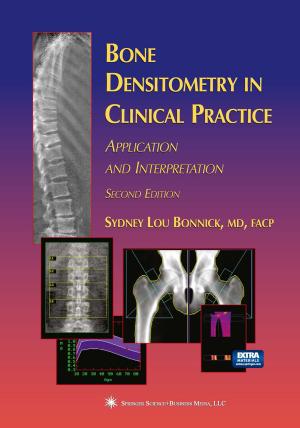Mitochondrial DNA, Mitochondria, Disease and Stem Cells
Nonfiction, Science & Nature, Science, Biological Sciences, Cytology, Other Sciences, Molecular Biology| Author: | ISBN: | 9781627031011 | |
| Publisher: | Humana Press | Publication: | September 26, 2012 |
| Imprint: | Humana | Language: | English |
| Author: | |
| ISBN: | 9781627031011 |
| Publisher: | Humana Press |
| Publication: | September 26, 2012 |
| Imprint: | Humana |
| Language: | English |
This volume investigates how the mitochondrial genome is transmitted, segregated, and inherited. It starts by describing mtDNA mutations and deletions and how these impact on the offspring’s well-being. It progresses to discuss how mutations to the mtDNA-nuclear-encoded transcription, replication and translational factors lead to mtDNA-depletion syndromes and how these affect cellular function and lead to the pathology of human mitochondrial disease. It also highlights the importance of the mitochondrial assembly factors and how mutations to these can lead to mitochondrial disease. The reader is then introduced to how mtDNA is transmitted through the oocyte and how stem cells can be used to study mitochondrial biogenesis and mtDNA replication and transcription in undifferentiated pluripotent and differentiating cells and how mitochondria adapt during this process. It then discusses how diseases like cancer are initiated and regulated by mutations to mitochondrial DNA and dysfunctional mitochondria. Finally, it draws on assisted reproductive technologies to discuss how some of these approaches might be adapted to prevent the transmission of mutant and deleted mtDNA from one generation to the next.
This volume investigates how the mitochondrial genome is transmitted, segregated, and inherited. It starts by describing mtDNA mutations and deletions and how these impact on the offspring’s well-being. It progresses to discuss how mutations to the mtDNA-nuclear-encoded transcription, replication and translational factors lead to mtDNA-depletion syndromes and how these affect cellular function and lead to the pathology of human mitochondrial disease. It also highlights the importance of the mitochondrial assembly factors and how mutations to these can lead to mitochondrial disease. The reader is then introduced to how mtDNA is transmitted through the oocyte and how stem cells can be used to study mitochondrial biogenesis and mtDNA replication and transcription in undifferentiated pluripotent and differentiating cells and how mitochondria adapt during this process. It then discusses how diseases like cancer are initiated and regulated by mutations to mitochondrial DNA and dysfunctional mitochondria. Finally, it draws on assisted reproductive technologies to discuss how some of these approaches might be adapted to prevent the transmission of mutant and deleted mtDNA from one generation to the next.















